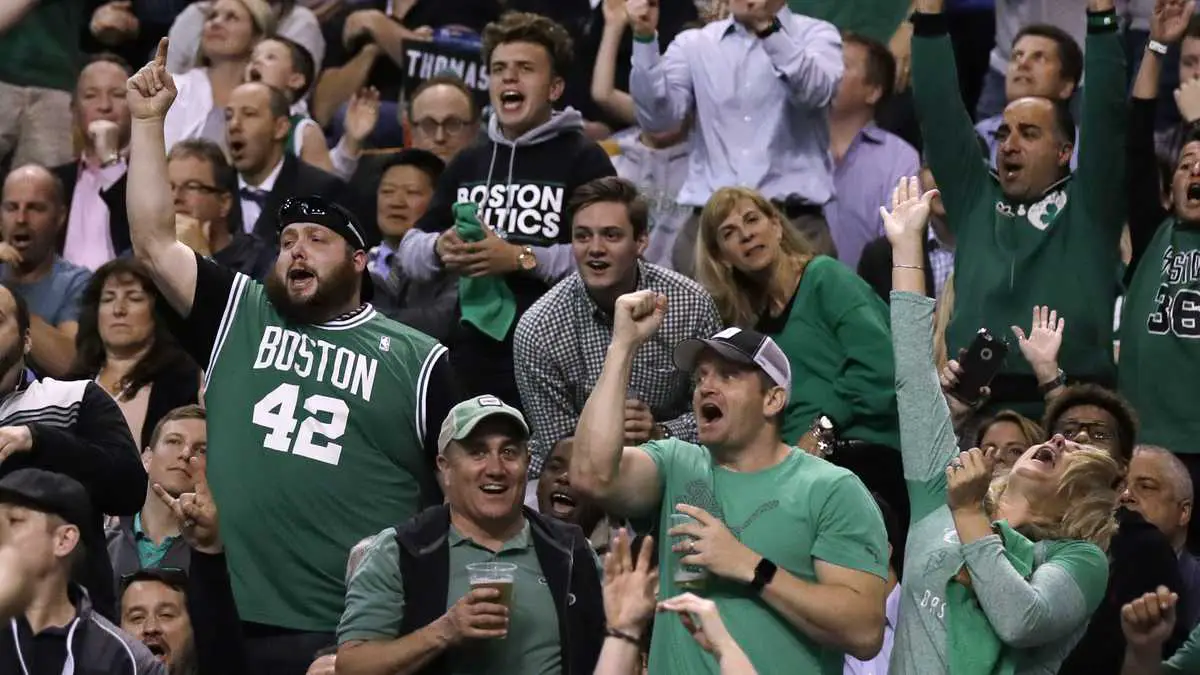Different NBA teams may have unique fanbase names for several reasons i.e., on the basis of:
- Team’s Unique Culture: Every NBA club has a distinct past, present, and future, all of which can affect how supporters identify with the group. These identities could result in the acceptance of particular
fanbase names. - Geographical Influence: The identity of a fan base can be greatly influenced by the team’s location. For instance, owing of the warm weather in Miami, supporters of the Miami Heat may be referred to as “Heat Nation,” but Utah Jazz supporters may be referred to as “Jazz Nation” because of the team’s ties to Salt Lake City’s jazz culture.
- Marketing as well as Branding: In order to develop a devoted fan base, NBA teams frequently invest in marketing and branding campaigns. Giving the fan base a distinctive moniker can strengthen the bonds of unity and belonging among supporters, strengthening their bond with the team.
- Traditions and Background History: Certain fan bases may have taken their names from past occasions, customs, or team-related traits. Over time, these names may come to represent the team.
- Fans Initiatives: Sometimes, in order to set themselves apart and foster a sense of unity among supporters, fan communities will take on nicknames or other identifiers.
The same fanbase craze is for the Boston Celtics which was established in 1946, since then it’s supporters call themselves with various names to associate themselves with the team, such as:
Tims: The story of “Tim” begins in the early 1900s, deep in the heart of Calton’s busy streets. According to legend, the “Tim Malloys,” a Catholic gang, stole their leader’s name and used it as their own. On the other hand, some people surmise that “Tim” originated as rhyming slang for “Bhoys,” the loving term for Celtic supporters. Whatever its true origins, the name struck a chord and came to represent the Celtic faithful.
All around the city, rival supporters—first of the Rangers and then of Sevco—appropriated “Tim” in a disparaging way, calling out any Celtic fan who was descended from a Catholic family. In the Celtic community, though, “Tim” grew beyond its religious meaning and became a loving term for fellow supporters.
Thanks to the unwavering commitment of the Celtic faithful, “Tim” is now more than just a word; it’s a symbol proudly inscribed on scarves, t-shirts, and a plethora of products. Although “Tim Malloys” has completely vanished from the public consciousness, remaining only in sentimental shouts from the terraces, “Tim” endures as a vivid symbol of Celtic identity.
Sharks: Celtic fans are not commonly referred to as “sharks.” individuals may use the term informally or as part of a joke or meme
But generally in sports a squad or collection of athletes renowned for their aggressive and predatory style of play—often defined by their capacity to overcome opponents quickly and decisively—is referred to as a “shark team” in most contexts. Teams that display dominance, strategic skill, and a never-ending quest for win are typically referred to by this word.
A “shark team” is frequently connected to sports like American football, basketball, or soccer where having a competitive advantage and using aggressive strategies are essential for winning. On the court or in the field, these teams are renowned for their predatory tendencies, as they aggressively take advantage of their opponents’ flaws and exploit them to win.
Poets: Because of their imaginative and passionate ways of expressing their affection for the club, Celtics fans sometimes referred as “poets”. This moniker captures both the rich cultural legacy that envelops the club and the intense emotional bond that Celtic fans have with their squad.
Celtic supporters frequently utilize songs, chants, banners, as well as displays to demonstrate their steadfast love for the team, much like poets who use words to describe complicated feelings and thoughts. These imaginative and passionate performances bolster Celtic Park’s lively vibe and foster a sense of camaraderie among supporters.
Furthermore, the word “poet” might also conjure up images of myth-making and storytelling, which are fundamental to Celtic culture and history. Celtic supporters frequently commemorate the team’s illustrious past, iconic players, and noteworthy triumphs through the chants as well as songs, which helps to create a shared story that unites supporters.
Feninans: Given the background of Celtic Football Club and its followers, the term “Fenians” has a complicated historical and cultural meaning. At first, the term “Fenian” applied to those who were part of an Irish nationalist movement in the 1800s that sought to free Ireland from British domination. A huge number of Irish communities, including those in Scotland, supported the primarily Catholic cause.
“Fenian” has come to be associated with Irish identity and Catholicism over time, and some Celtic supporters have embraced it as a way to identify themselves. For these supporters, Celtic is a club with deep historical links to Ireland and Catholicism, and being termed “Fenians” is a mark of pride in their Irish background.
It’s crucial to remember, though, that the name “Fenian” can also be used by those outside of the Celtic community in an insulting or sectarian way, especially when there are conflicts between Rangers and Celtic supporters. The phrase is frequently used in this context as a derogatory word directed at Celtic supporters, which reflects larger social and historical divides in Scotland.

FOR MORE LATEST AND INTERESTING BLOGS PLEASE VISIT OUR PAGE = https://usabloghouse.com/blogs/
